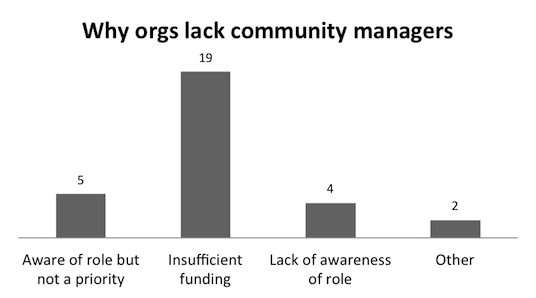Posted by Dan Richman, Program Assistant for the Community Engagement Fellows Program
In our first post about results from the State of Scientific Community Management Survey, we reported that while over half of community managers in science organizations have PhDs, their community management skills are usually self-taught or garnered through reading, networking, or mentorship.
In this post we report an overview of the types of organizations that were sampled by our survey, and why some organizations don’t have community managers. This is important for the Community Engagement Fellows Program because we intend to support scientific community managers in two broad variations of the role – either within professional societies and organizations or within research collaborations. We want to understand more about what those workplaces look like and how they differ.
Organizing the organizations – three broad types are seen
Survey respondents may recall choosing what type of organization their community is associated with. The organization types represented in the results were the following:
– Professional societies and nonprofit associations, including advocacy groups and discipline-specific networks
– Higher education institutions, at which the respondents represented research administration roles as well as professors
– Collaborations of more than one research group
– Research institutes within higher education institutions and outside of academia
– A STEM publisher, several informal communities of interest or practice, and scientific blogging initiatives
We did not find any complete responses from K-12 educational institutions, government agencies, or companies. And while no one explicitly chose individual research group, we think that category may in fact be represented by some of the higher education institution responses.
We very quickly discovered that it’s hard to judge only from organization type whether the community in question directly performs research. So we’ve taken into consideration not only organization type but also respondents’ self-declared titles and institutions (which we will not share), organization sizes, and departments.
We found that there are three umbrella classifications that describe the communities: research, higher-education administration, and any type of association (including nonprofits, networks, and informal groups) (Figure 1).

Which organizations lack community managers – and why?
It turns out that organization type doesn’t strongly predict whether there will be a dedicated (volunteer or paid) community manager. All the types listed above are represented in both the yes-there’s-a-community-manager and no-there’s-not subsets.
But what we did find is that among organizations that don’t have a community manager—there were 30 in our set of 108 complete responses by July 21, 2016—there’s a dominant reason for lacking it: 63% of organizations without a community manager say insufficient funding is the reason they lack the role (Figure 2).

It’s worth noting that lack of awareness may be underrepresented in our sample because the survey was mostly discovered or shared in circles where there is already an awareness of the concept of community management.
Nonetheless, this result suggests that more needs to be done to demonstrate the value of the role, which is what we hope to do through our fellowship program. Can dedicated community management improve collaborative research? Help scientists make connections across disciplines and across institutions, regions, and nations? Spread expertise throughout associations and networks? Hopefully any of these effects can be shown to warrant investment of funding and staff.
This finding, that organizations without a community manager cite funding issues, corresponds well with my experience on the ground. Most scientific societies (the groups I’m most familiar with re: community management) rely on volunteers to fill these types of roles. Sometimes that works well, if you get an especially dedicated volunteer(s). But more often than not community ,an age mentioned is an ad hoc arrangement addressed by a rag tag group of people who all have other (usually volunteer) responsibilities, and don’t really know what community engagement is or why it’s so critical. We served as community managers for a scientific society for a year. By the second year they decided we weren’t worth the money. In my mind, that decision also showed that they didn’t think their society was worth the investment.
Thanks for the example, Sarah. I’m curious whether we’ll encounter similar responses as we start to work with scientific societies on the Community Engagement Fellows Program. We are hoping to institutionalize the role, which boils down to demonstrating its value. I think scientific societies are an interesting case: They’re about organizing people around a topic or practice, so it seems like there is an intuitive kernel there about community management. Hopefully with a bunch of community managers across multiple organizations we’ll be able to collect the kind of positive impacts that will make that value easier to demonstrate.
Sounds like a solid idea in theory – I really hope it works out in practice. Perhaps once other scientific societies see through success of the ones you work with, they may be more keen to have their own community manager.